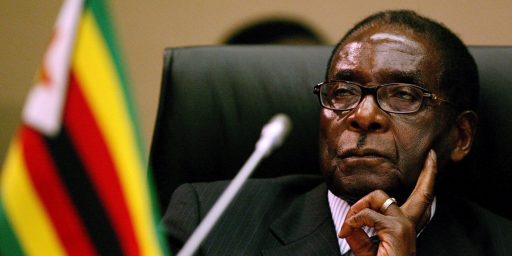Price Caps Crippling Zimbabwe Economy
Zimbabwe’s already shaky economy is going into a tailspin after Robert Mugabe ordered price caps.
Robert G. Mugabe has ruled over this battered nation, his every wish endorsed by Parliament and enforced by the police and soldiers, for more than 27 years. It appears, however, that not even an unchallenged autocrat can repeal the laws of supply and demand.
One month after Mr. Mugabe decreed just that, commanding merchants nationwide to counter 10,000-percent-a-year hyperinflation by slashing prices in half and more, Zimbabwe’s economy is at a halt.
Bread, sugar and cornmeal, staples of every Zimbabwean’s diet, have vanished, seized by mobs who denuded stores like locusts in wheat fields. Meat is virtually nonexistent, even for members of the middle class who have money to buy it on the black market. Gasoline is nearly unobtainable. Hospital patients are dying for lack of basic medical supplies. Power blackouts and water cutoffs are endemic.
Manufacturing has slowed to a crawl because few businesses can produce goods for less than their government-imposed sale prices. Raw materials are drying up because suppliers are being forced to sell to factories at a loss. Businesses are laying off workers or reducing their hours.
Shocking.
Bruce McQuain suggests that this is “a lesson that many in this country would be wise to heed.” Mark Perry agrees, citing “minimum wage laws, rent control laws, price gouging laws” and the like as parallels.
Thankfully, our interference with the laws of supply and demand are relatively marginal and thus the damage is relatively contained. Still, there’s not much doubt that ordering people to charge less for goods than it costs to provides them will lead to suboptimal provision.
Government has a role to play in regulating the excesses of the market. But the tendency is to do more harm than good. It only seems fair that someone putting in a full day’s work should be able to provide for his family; but if he doesn’t provide more value than that to his employer, he’s not going to get hired. Affordable rent is a great idea but not if it means no apartments are available. We don’t want people to take advantage of disasters by jacking up the prices of available goods; at the same time, though, we want to encourage badly needed goods being brought to the area.




You have obviously not seen the Farm bills for the past few decades!
I am not sure how apposite a comparison is between the US and Zimbabwe, but the feds give a HUGE subsidy to consumers through supports for basic crops.
Throwing $16 billion a year into agricultural subsidies is not what I would call “marginal.”
This has been proven true throughout our history.
This is generally untrue.
What is true is that when government acts on the behalf of corporate interests through subsidies and tax breaks then government does more harm than good.
“Government has a role to play in regulating the excesses of the market.”
NO! Government is totally incapable of regulating anything, including itself, but especially the market. History has shown this over and over again. Zimbabwe is only the latest and most pronounced example of this.
The only regulation government should do, and I say this with reservation, is to prevent industry-wide price fixing schemes. Other than that, it should step aside and let free-market forces take care of things.
The problem is that what is good for a free-market is not always what is good for a population. The government’s job is to protect the population, not the market. Where there is no conflict, the government should not interfere, but sometimes a free-market can grow if it allows some part of the population to suffer, and then the government’s responsibility to protect them should override the freedom of the market.
Having lived in Africa for 2 years, I am well acquainted with the wiles and catastrophes of the Mugabe ‘dictatorship.’
A popular and witty saying that I love: “Rob Mugabe before he robs you.” I have a t-shirt to spread the wittiness.
These terrible economic policies aren’t the worst of his presidency. He reigns through terror, and most Americans have never heard of him.
While I lived in South Africa, there was a lot of hatred towards Bush and the situation in Iraq, more so than here, at that time. However, the complaint that I heard more often than all the others was, “If Bush is going to take out Saddam, why doesn’t he take out Mugabe as well?”
It really is a terrible situation there in Zim, but the UN will do nothing. Although other nations express their hatred, many of the Africans LOVE America and hope her good influence will spread, especially to Africa.